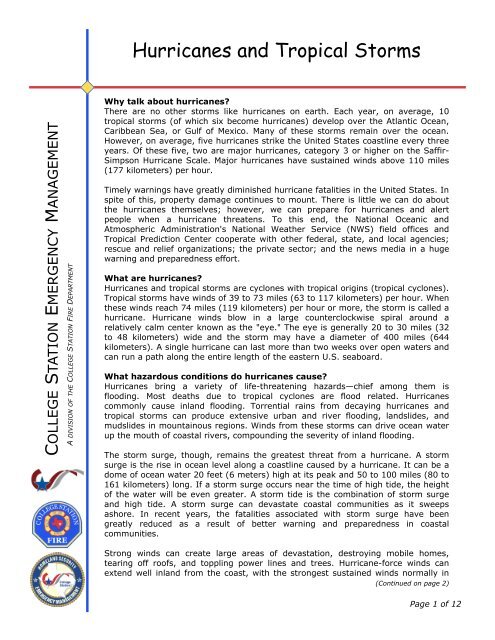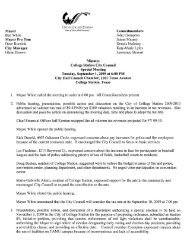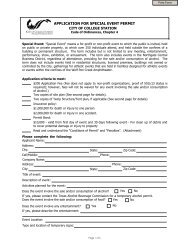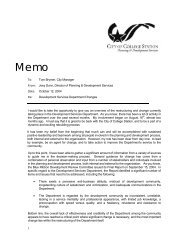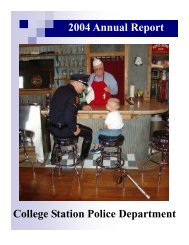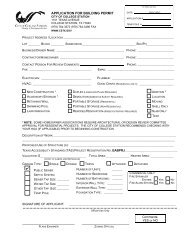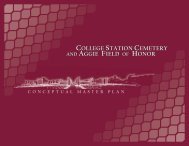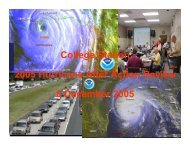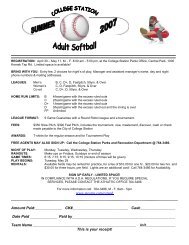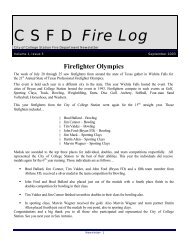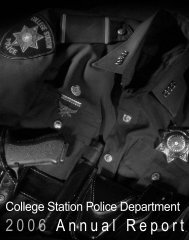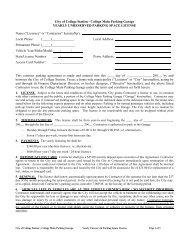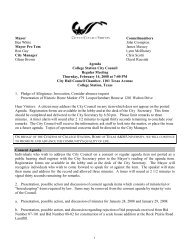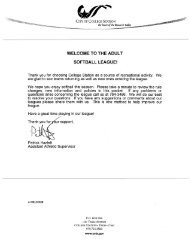Hurricanes and Tropical Storms - City of College Station
Hurricanes and Tropical Storms - City of College Station
Hurricanes and Tropical Storms - City of College Station
Create successful ePaper yourself
Turn your PDF publications into a flip-book with our unique Google optimized e-Paper software.
<strong>Hurricanes</strong> <strong>and</strong> <strong>Tropical</strong> <strong>Storms</strong><br />
COLLEGE STATION EMERGENCY MANAGEMENT<br />
A DIVISION OF THE COLLEGE STATION FIRE DEPARTMENT<br />
Why talk about hurricanes?<br />
There are no other storms like hurricanes on earth. Each year, on average, 10<br />
tropical storms (<strong>of</strong> which six become hurricanes) develop over the Atlantic Ocean,<br />
Caribbean Sea, or Gulf <strong>of</strong> Mexico. Many <strong>of</strong> these storms remain over the ocean.<br />
However, on average, five hurricanes strike the United States coastline every three<br />
years. Of these five, two are major hurricanes, category 3 or higher on the Saffir-<br />
Simpson Hurricane Scale. Major hurricanes have sustained winds above 110 miles<br />
(177 kilometers) per hour.<br />
Timely warnings have greatly diminished hurricane fatalities in the United States. In<br />
spite <strong>of</strong> this, property damage continues to mount. There is little we can do about<br />
the hurricanes themselves; however, we can prepare for hurricanes <strong>and</strong> alert<br />
people when a hurricane threatens. To this end, the National Oceanic <strong>and</strong><br />
Atmospheric Administration's National Weather Service (NWS) field <strong>of</strong>fices <strong>and</strong><br />
<strong>Tropical</strong> Prediction Center cooperate with other federal, state, <strong>and</strong> local agencies;<br />
rescue <strong>and</strong> relief organizations; the private sector; <strong>and</strong> the news media in a huge<br />
warning <strong>and</strong> preparedness effort.<br />
What are hurricanes?<br />
<strong>Hurricanes</strong> <strong>and</strong> tropical storms are cyclones with tropical origins (tropical cyclones).<br />
<strong>Tropical</strong> storms have winds <strong>of</strong> 39 to 73 miles (63 to 117 kilometers) per hour. When<br />
these winds reach 74 miles (119 kilometers) per hour or more, the storm is called a<br />
hurricane. Hurricane winds blow in a large counterclockwise spiral around a<br />
relatively calm center known as the "eye." The eye is generally 20 to 30 miles (32<br />
to 48 kilometers) wide <strong>and</strong> the storm may have a diameter <strong>of</strong> 400 miles (644<br />
kilometers). A single hurricane can last more than two weeks over open waters <strong>and</strong><br />
can run a path along the entire length <strong>of</strong> the eastern U.S. seaboard.<br />
What hazardous conditions do hurricanes cause?<br />
<strong>Hurricanes</strong> bring a variety <strong>of</strong> life-threatening hazards—chief among them is<br />
flooding. Most deaths due to tropical cyclones are flood related. <strong>Hurricanes</strong><br />
commonly cause inl<strong>and</strong> flooding. Torrential rains from decaying hurricanes <strong>and</strong><br />
tropical storms can produce extensive urban <strong>and</strong> river flooding, l<strong>and</strong>slides, <strong>and</strong><br />
mudslides in mountainous regions. Winds from these storms can drive ocean water<br />
up the mouth <strong>of</strong> coastal rivers, compounding the severity <strong>of</strong> inl<strong>and</strong> flooding.<br />
The storm surge, though, remains the greatest threat from a hurricane. A storm<br />
surge is the rise in ocean level along a coastline caused by a hurricane. It can be a<br />
dome <strong>of</strong> ocean water 20 feet (6 meters) high at its peak <strong>and</strong> 50 to 100 miles (80 to<br />
161 kilometers) long. If a storm surge occurs near the time <strong>of</strong> high tide, the height<br />
<strong>of</strong> the water will be even greater. A storm tide is the combination <strong>of</strong> storm surge<br />
<strong>and</strong> high tide. A storm surge can devastate coastal communities as it sweeps<br />
ashore. In recent years, the fatalities associated with storm surge have been<br />
greatly reduced as a result <strong>of</strong> better warning <strong>and</strong> preparedness in coastal<br />
communities.<br />
Strong winds can create large areas <strong>of</strong> devastation, destroying mobile homes,<br />
tearing <strong>of</strong>f ro<strong>of</strong>s, <strong>and</strong> toppling power lines <strong>and</strong> trees. Hurricane-force winds can<br />
extend well inl<strong>and</strong> from the coast, with the strongest sustained winds normally in<br />
(Continued on page 2)<br />
Page 1 <strong>of</strong> 12
<strong>Hurricanes</strong> <strong>and</strong> <strong>Tropical</strong> <strong>Storms</strong><br />
COLLEGE STATION EMERGENCY MANAGEMENT<br />
A DIVISION OF THE COLLEGE STATION FIRE DEPARTMENT<br />
(Continued from page 1)<br />
the eastern half <strong>of</strong> the storm. In addition, hurricanes can spawn tornadoes, which<br />
add to the destructiveness <strong>of</strong> the storm.<br />
How can I protect myself in a hurricane situation?<br />
Preparation is the best protection against the dangers <strong>of</strong> a hurricane. Well before a<br />
hurricane threatens, people should make their homes as “hurricane pro<strong>of</strong>” as<br />
possible <strong>and</strong> plan <strong>and</strong> practice what they will do if they are advised to evacuate.<br />
And most important, people should evacuate the area if advised by authorities to do<br />
so, even if they themselves do not think the situation looks threatening.<br />
Eighty to 90 percent <strong>of</strong> the people who live in hurricane-prone areas have never<br />
experienced the core <strong>of</strong> a major hurricane. Many <strong>of</strong> these people have been through<br />
weaker storms <strong>and</strong> have a false impression <strong>of</strong> a hurricane's damage potential. This<br />
can lead to complacency <strong>and</strong> delayed actions that result in injuries <strong>and</strong> death. Over<br />
the past several years, the hurricane warning system has provided adequate time<br />
for people on barrier isl<strong>and</strong>s <strong>and</strong> the immediate coastline to move inl<strong>and</strong> when<br />
hurricanes threaten. However, it is becoming more difficult to evacuate people from<br />
the barrier isl<strong>and</strong>s <strong>and</strong> other coastal areas because road construction has<br />
not kept pace with the rapid population growth. If authorities advise people to<br />
evacuate, it is best to leave as soon as possible to avoid traffic tie-ups.<br />
The best ways to protect your home are to install permanent hurricane shutters on<br />
windows <strong>and</strong> doors, tie the ro<strong>of</strong> to the mainframe <strong>of</strong> your home with metal straps,<br />
<strong>and</strong> prepare a “wind safe” room. NOTE: a “wind safe” room would be used only for<br />
locations where residents have not been asked to leave or evacuate. If you do not<br />
have permanent hurricane shutters, use plywood. Well before there is the threat <strong>of</strong><br />
a hurricane, buy half-inch plywood boards suitable for outside use—marine plywood<br />
is best. Cut the boards to fit the outside frame <strong>of</strong> each window <strong>and</strong> door; drill the<br />
holes for the screws <strong>and</strong> install the anchors so you can quickly board up your home<br />
if necessary. Write on each board which opening it fits. Do not tape glass. Taping<br />
does not prevent glass from breaking <strong>and</strong> takes critical time from more effective<br />
preparedness measures.<br />
Every home in hurricane-prone areas should have ready the items needed to board<br />
up windows <strong>and</strong> doors. When a hurricane threatens, supplies are quickly sold out at<br />
stores. Most homes destroyed during recent hurricanes had no window protection.<br />
When wind enters a home through broken windows, the pressure that builds<br />
against the walls can lift a ro<strong>of</strong> <strong>and</strong> cause walls to collapse.<br />
Make sure that you protect any outbuildings that may house animals in the same<br />
way you protect your home.<br />
What is the best source <strong>of</strong> information in a hurricane situation?<br />
Local radio or television stations or a NOAA Weather Radio are the best sources <strong>of</strong><br />
information in a hurricane situation for <strong>of</strong>ficial weather <strong>and</strong> weather-related<br />
bulletins. NOAA Weather Radio is the prime alerting <strong>and</strong> critical information delivery<br />
system <strong>of</strong> the National Weather Service (NWS). NOAA Weather Radio broadcasts<br />
warnings, watches, forecasts, <strong>and</strong> other hazard information 24 hours a day over<br />
(Continued on page 3)<br />
Page 2 <strong>of</strong> 12
<strong>Hurricanes</strong> <strong>and</strong> <strong>Tropical</strong> <strong>Storms</strong><br />
COLLEGE STATION EMERGENCY MANAGEMENT<br />
A DIVISION OF THE COLLEGE STATION FIRE DEPARTMENT<br />
(Continued from page 2)<br />
more than 650 stations in the 50 states, adjacent coastal waters, Puerto Rico, the<br />
U.S. Virgin Isl<strong>and</strong>s, <strong>and</strong> the U.S. Pacific territories. The NWS encourages people to<br />
buy a weather radio equipped with the Specific Area Message Encoder (SAME)<br />
feature. This feature automatically alerts you when important information is issued<br />
about hurricanes or other weather-related hazards for your area. Information on<br />
NOAA Weather Radio is available from your local NWS <strong>of</strong>fice or at<br />
www.nws.noaa.gov/nwr.<br />
Watch, Warning<br />
• A Hurricane/<strong>Tropical</strong> Storm WATCH means there is a threat <strong>of</strong> hurricane/tropical<br />
storm conditions within 36 hours. People in a watch area should review their<br />
hurricane plans (Family Disaster Plan, Disaster Supplies Kit, evacuation routes),<br />
keep informed, <strong>and</strong> be ready to act if a warning is issued.<br />
• A Hurricane/<strong>Tropical</strong> Storm WARNING means hurricane/tropical storm conditions<br />
are expected in 24 hours or less. When a warning is issued, people should<br />
complete their storm preparations <strong>and</strong> leave the threatened area if directed to<br />
do so by local <strong>of</strong>ficials.<br />
A hurricane/tropical storm local statement, issued every two to three hours by local<br />
National Weather Service (NWS) <strong>of</strong>fices, summarizes all <strong>of</strong> the watches <strong>and</strong><br />
warnings, evacuation information, <strong>and</strong> most immediate threats to an area.<br />
Watches <strong>and</strong> warnings for hurricanes <strong>and</strong> tropical storms are issued by the NWS<br />
<strong>and</strong> broadcast on NOAA Weather Radio <strong>and</strong> on local radio <strong>and</strong> television stations.<br />
Be Prepared for a Hurricane<br />
Protect Yourself<br />
For general preparedness, every household should create <strong>and</strong> practice a Family<br />
Disaster Plan <strong>and</strong> assemble <strong>and</strong> maintain a Disaster Supplies Kit. In addition, every<br />
household should take hurricane specific precautions <strong>and</strong> plan for <strong>and</strong> practice what<br />
to do in a hurricane situation.<br />
If you are at risk from hurricanes, you should:<br />
• Talk to your insurance agent. Homeowners' policies do not cover flooding from<br />
hurricanes. Ask about the National Flood Insurance Program (NFIP).<br />
• Ask about your community's hurricane preparedness plan. The local emergency<br />
management <strong>of</strong>fice or local chapter <strong>of</strong> the American Red Cross should be able to<br />
provide you with details <strong>of</strong> this plan, including information on the safest<br />
evacuation routes, nearby shelters, <strong>and</strong> what conditions would trigger a<br />
recommendation to evacuate certain areas.<br />
• Develop a hurricane evacuation plan. All members <strong>of</strong> your household should<br />
know where to go if they have to leave. Making plans well in advance will help<br />
you avoid last-minute confusion.<br />
• Discuss hurricanes with members <strong>of</strong> your household. Everyone should know<br />
what to do in case all members are not together. Discussing hurricanes <strong>and</strong><br />
(Continued on page 4)<br />
Page 3 <strong>of</strong> 12
<strong>Hurricanes</strong> <strong>and</strong> <strong>Tropical</strong> <strong>Storms</strong><br />
COLLEGE STATION EMERGENCY MANAGEMENT<br />
A DIVISION OF THE COLLEGE STATION FIRE DEPARTMENT<br />
(Continued from page 3)<br />
reviewing flood safety <strong>and</strong> preparedness measures ahead <strong>of</strong> time will help<br />
reduce fear <strong>and</strong> save precious time in an emergency.<br />
• Determine where to move your boat in an emergency. Marinas <strong>and</strong> other<br />
storage facilities may fill up quickly. Some locations may have less risk <strong>of</strong><br />
damage than others. You may be required to secure your boat well in advance<br />
<strong>of</strong> an approaching hurricane.<br />
• Protect your animals. Ensure that any outbuildings, pastures, or corrals that<br />
house animals are protected in the same way as your home. When installing or<br />
changing fence lines, consider placing them in such a way that your animals are<br />
able to move to higher water in the event <strong>of</strong> flooding. Get rid <strong>of</strong> debris around<br />
your home <strong>and</strong> any outbuildings as well as in pastures.<br />
• Know where to go with your animals. Because evacuation shelters generally do<br />
not accept pets, except for service animals, you must plan ahead to ensure that<br />
your family <strong>and</strong> pets will have a safe place to stay. Do this research well before<br />
disaster strikes.<br />
Protect Your Property<br />
If you are at risk from hurricanes, well before a hurricane threatens, you should:<br />
• Make a list <strong>of</strong> items to bring inside in the event <strong>of</strong> a storm. A list will help you<br />
remember anything that can be broken or picked up by strong winds.<br />
• Install permanent hurricane shutters if possible.<br />
• If you do not have hurricane shutters, buy the plywood <strong>and</strong> other items needed<br />
to board up windows <strong>and</strong> doors. Get half-inch outdoor plywood— marine<br />
plywood is best. Cut it to fit the outside frame <strong>of</strong> each window <strong>and</strong> door <strong>and</strong> drill<br />
the holes <strong>and</strong> install the anchors for the screws. Write on each board which<br />
window it fits. Do not tape windows. Taping does not prevent windows from<br />
breaking <strong>and</strong> takes critical time from more effective preparedness measures.<br />
• Remove any debris or loose items in your yard. Hurricane winds, <strong>of</strong>ten in excess<br />
<strong>of</strong> 100 miles (161 kilometers) per hour, can turn unanchored items into deadly<br />
missiles.<br />
• Keep trees <strong>and</strong> shrubbery trimmed. Make trees more wind resistant by<br />
removing diseased or damaged limbs, then strategically remove branches so<br />
that wind can blow through. Hurricane winds frequently break weak limbs <strong>and</strong><br />
hurl them at great speed, damaging whatever they hit. Debris collection<br />
services may not be operating just before a storm, so it is best to do this well in<br />
advance <strong>of</strong> an approaching storm.<br />
• Fix loose rain gutters <strong>and</strong> downspouts <strong>and</strong> clear them if they are clogged.<br />
<strong>Hurricanes</strong> <strong>of</strong>ten bring long periods <strong>of</strong> heavy rain. Cleaning <strong>and</strong> securing<br />
drainage systems will help protect your home from water damage.<br />
• Strengthen garage doors. Hurricane winds can enter through a damaged garage<br />
door, lift the ro<strong>of</strong>, <strong>and</strong> destroy the home.<br />
• Have an engineer check your home <strong>and</strong> tell you about ways to make it more<br />
resistant to hurricane winds. There are a variety <strong>of</strong> ways to protect your home.<br />
Pr<strong>of</strong>essionals can advise you <strong>of</strong> engineering requirements, building permits, or<br />
local planning <strong>and</strong> zoning regulations that could help you protect your home,<br />
<strong>and</strong> can inspect your home to see if the ro<strong>of</strong> is tied to the mainframe securely<br />
with metal straps, the house is bolted to its foundation, <strong>and</strong> the best place in<br />
your home to prepare a “wind safe” room.<br />
(Continued on page 5)<br />
Page 4 <strong>of</strong> 12
<strong>Hurricanes</strong> <strong>and</strong> <strong>Tropical</strong> <strong>Storms</strong><br />
COLLEGE STATION EMERGENCY MANAGEMENT<br />
A DIVISION OF THE COLLEGE STATION FIRE DEPARTMENT<br />
(Continued from page 4)<br />
• Elevate coastal homes. Raising structures to a certain height will make them<br />
more resistant to hurricane-driven water. There may be many local codes<br />
affecting how <strong>and</strong> where homes can be elevated. Meet with your emergency<br />
manager or planning <strong>and</strong> zoning <strong>of</strong>ficial to learn about having your home<br />
elevated. Community funds may be available for such measures.<br />
• If you live in a floodplain or area prone to flooding, follow flood preparedness<br />
precautions. <strong>Tropical</strong> cyclones can bring great amounts <strong>of</strong> rain <strong>and</strong> frequently<br />
cause floods. Some hurricanes have dropped more than 10 inches (25<br />
centimeters) <strong>of</strong> rain in just a few hours.<br />
• Take similar measures to protect your animals. Make sure that you strengthen<br />
<strong>and</strong> protect any outbuildings that may house animals in the same way you<br />
protect your home.<br />
• Explore sheltering options for your pets. Contact relatives, friends, hotels <strong>and</strong><br />
motels, <strong>and</strong> other facilities to make a definite plan for sheltering your animals.<br />
Many communities are developing emergency animal shelters similar to shelters<br />
for people. Contact your local emergency management agency to find out about<br />
emergency animal shelters in your community, in the event that you have<br />
nowhere else to go <strong>and</strong> need to go to public shelter with your animals.<br />
• Include your pets in your evacuation <strong>and</strong> sheltering drills. Practice evacuating<br />
your pets so they will get used to entering <strong>and</strong> traveling calmly in their carriers.<br />
If you have horses or other large animals, be sure that they are accustomed to<br />
entering a trailer. Practice bringing your pets indoors, into your safe room, so<br />
that if you are required to shelter in place, they will be comfortable.<br />
What to Do During a Hurricane/<strong>Tropical</strong> Storm Watch<br />
You should:<br />
• Use a NOAA Weather Radio or listen continuously to a local station on a<br />
portable, battery-powered radio or television. <strong>Hurricanes</strong> can change direction,<br />
intensity, <strong>and</strong> speed suddenly. What was a minor threat several hours ago can<br />
quickly escalate to a major threat.<br />
• Heed the advice <strong>of</strong> local <strong>of</strong>ficials, <strong>and</strong> evacuate if they advise it. Following their<br />
advice is your best protection. Avoid flooded roads <strong>and</strong> watch for washed-out<br />
bridges. Local <strong>of</strong>ficials may close certain roads, especially near the coast, when<br />
effects <strong>of</strong> the hurricane reach the coast.<br />
• Prepare your property for high winds. Hurricane winds can lift large, heavy<br />
objects <strong>and</strong> send them crashing into homes. Anything not secured may become<br />
a deadly or damaging projectile.<br />
• Bring lawn furniture inside, as well as outdoor decorations or ornaments, trash<br />
cans, hanging plants, or anything else that can be picked up by the wind.<br />
• Secure your home by closing the windows <strong>and</strong> doors <strong>and</strong> then closing the<br />
hurricane shutters. If you do not have hurricane shutters, close <strong>and</strong> board up all<br />
windows <strong>and</strong> doors.<br />
• If possible <strong>and</strong> if it can be safely done, remove outside antennas.<br />
• Moor a boat securely or move it to a designated safe place. Use rope or chain to<br />
secure a boat to a trailer. Use tie-downs to anchor a trailer to the ground or to a<br />
building.<br />
(Continued on page 6)<br />
Page 5 <strong>of</strong> 12
<strong>Hurricanes</strong> <strong>and</strong> <strong>Tropical</strong> <strong>Storms</strong><br />
COLLEGE STATION EMERGENCY MANAGEMENT<br />
A DIVISION OF THE COLLEGE STATION FIRE DEPARTMENT<br />
(Continued from page 5)<br />
• Fill your car's gas tank. If advised to evacuate, you may have to travel a long<br />
distance or you may be stuck in traffic for a long time. Gas stations along the<br />
route may be closed.<br />
• Stock up on prescription medications. Stores <strong>and</strong> pharmacies may be closed<br />
after the storm.<br />
• If you are in a mobile home, check the tie-downs. Mobile homes may be less<br />
affected by strong winds if they are tied down according to the manufacturer's<br />
instructions. Properly tied-down homes are more likely to stay fixed to their<br />
foundations. Historically, mobile homes suffer the greatest amount <strong>of</strong> damage<br />
during hurricanes. Prior to 1994, most mobile homes were not designed to<br />
withst<strong>and</strong> even moderate winds.<br />
• Check your Disaster Supplies Kit. Some supplies may need to be replaced or<br />
restocked.<br />
• Turn the refrigerator <strong>and</strong> freezer to the coldest setting. Open them only when<br />
absolutely necessary, then close them quickly. Keeping the coldest air in will<br />
help perishables last much longer in the event <strong>of</strong> a power failure.<br />
• Store valuables <strong>and</strong> personal papers in a safety deposit box in a waterpro<strong>of</strong><br />
container on the highest level <strong>of</strong> your home. <strong>Hurricanes</strong> can cause much water<br />
damage inside homes. Protecting valuables in this manner will provide the best<br />
security.<br />
• Turn <strong>of</strong>f utilities if told to do so by authorities. Authorities may ask you to turn<br />
<strong>of</strong>f water or electric utilities to prevent damage to your home or within the<br />
community. Most <strong>of</strong> the time they will tell you to leave the gas on because, if<br />
you shut if <strong>of</strong>f, a pr<strong>of</strong>essional is required to turn your gas back on, <strong>and</strong> it may<br />
be several weeks before you receive service.<br />
• Turn <strong>of</strong>f propane tanks. Propane tanks may be damaged or dislodged by strong<br />
winds or water. Turning them <strong>of</strong>f reduces the fire potential.<br />
• Unplug small appliances. Small appliances may be affected by electrical power<br />
surges that may occur as the storm approaches. Unplugging them reduces<br />
potential damage.<br />
• Review your evacuation plan. Make sure your planned route is the same as the<br />
currently recommended route. Sometimes roads may be closed or blocked,<br />
requiring a different route.<br />
• Stay away from floodwater. If you come upon a flooded road, turn around <strong>and</strong><br />
go another way. Ab<strong>and</strong>on your vehicle immediately <strong>and</strong> climb to higher ground<br />
if the vehicle becomes surrounded by water or the engine stalls, <strong>and</strong> if you can<br />
safely get out. Most people attempting to drive through water. The depth <strong>of</strong><br />
water is not always obvious. The roadbed may be washed out under the water,<br />
<strong>and</strong> you could be str<strong>and</strong>ed or trapped. Rapidly rising water may stall the engine,<br />
engulf the vehicle <strong>and</strong> its occupants, <strong>and</strong> sweep them away. T hurricane-related<br />
deaths are caused by floods, <strong>and</strong> most flood fatalities are caused by wo feet<br />
(0.6 meter) <strong>of</strong> water will carry away most automobiles, SUVs, <strong>and</strong> pickup<br />
trucks.<br />
• Consider a precautionary evacuation <strong>of</strong> large or numerous animals. If you think<br />
an evacuation might be advised or ordered <strong>and</strong> if you have large, unusual, or<br />
numerous animals, start evacuating them as soon as you are aware <strong>of</strong><br />
impending danger. If you are using a horse or other trailer to evacuate your<br />
(Continued on page 7)<br />
Page 6 <strong>of</strong> 12
<strong>Hurricanes</strong> <strong>and</strong> <strong>Tropical</strong> <strong>Storms</strong><br />
COLLEGE STATION EMERGENCY MANAGEMENT<br />
A DIVISION OF THE COLLEGE STATION FIRE DEPARTMENT<br />
(Continued from page 6)<br />
animals, move early rather than wait until it may be too late to maneuver a<br />
trailer through slow traffic. The winds or water may be too high, or other<br />
hazards may make this too dangerous for you <strong>and</strong> for them.<br />
What to Do During a Hurricane/<strong>Tropical</strong> Storm Warning<br />
You should:<br />
• Use a NOAA Weather Radio or continuously listen to a local station on a<br />
portable, battery-powered radio or television. <strong>Hurricanes</strong> can change direction,<br />
intensity, <strong>and</strong> speed suddenly.<br />
• If <strong>of</strong>ficials advise you to leave your home, go as soon as possible. Take your<br />
Disaster Supplies Kit <strong>and</strong> go to a shelter or to the out-<strong>of</strong>-town contact identified<br />
in your Family Disaster Plan. Call your contact <strong>and</strong> tell him or her when you are<br />
leaving <strong>and</strong> where you are going. Local <strong>of</strong>ficials will advise you to evacuate only<br />
if they conclude that you are in danger. It is important to follow their<br />
instructions as soon as possible. Roads may become blocked <strong>and</strong> the storm can<br />
worsen, preventing safe escape.<br />
• If you evacuate, take your pets with you. If it is not safe for you, it is not safe<br />
for them. Be sure to take your pet disaster kit with you. Leaving them will<br />
endanger not only your pets, but also yourself <strong>and</strong> emergency responders.<br />
• If you are not advised to evacuate, stay indoors, away from windows, skylights,<br />
<strong>and</strong> doors, even if they are covered. Stay on the floor least likely to be affected<br />
by strong winds <strong>and</strong> floodwater. A small interior room without windows on the<br />
first floor is usually the safest place. Have as many walls between you <strong>and</strong> the<br />
outside winds as possible. Sometimes strong winds <strong>and</strong> projectiles may tear<br />
hurricane shutters <strong>of</strong>f, so stay away from windows even if they are covered. Lie<br />
on the floor under a table or other sturdy object. Being under a sturdy object<br />
will <strong>of</strong>fer greater protection from falling objects.<br />
• Close all interior doors. Secure external doors. Closed doors will help prevent<br />
damaging hurricane winds from entering rooms.<br />
• Have a supply <strong>of</strong> flashlights <strong>and</strong> extra batteries h<strong>and</strong>y. Flashlights provide the<br />
safest emergency lighting source. DO NOT USE CANDLES. Do not use kerosene<br />
lamps, which require a great deal <strong>of</strong> ventilation <strong>and</strong> are not designed for indoor<br />
use.<br />
• Store drinking water in clean plastic bottles <strong>and</strong> cooking utensils. Public water<br />
supplies <strong>and</strong> wells may become contaminated, or electric pumps may be<br />
inoperative if power is lost. Often, a person’s greatest need following a disaster<br />
is water.<br />
• Fill bathtubs <strong>and</strong> sinks with water to use for flushing the toilet <strong>and</strong> washing<br />
floors <strong>and</strong> clothing. Do not use water that has been stored in glazed tubs or<br />
sinks for drinking or to bathe young children because over time lead can leach<br />
from the glaze into the water.<br />
• If power is lost, turn <strong>of</strong>f major appliances to reduce the power surge when<br />
electricity is restored. When electricity is restored, the surge from many major<br />
appliances starting at the same time may cause damage or destroy the<br />
appliances.<br />
• Turning <strong>of</strong>f or unplugging major appliances will allow you to decide when it is<br />
best to turn them back on.<br />
(Continued on page 8)<br />
Page 7 <strong>of</strong> 12
<strong>Hurricanes</strong> <strong>and</strong> <strong>Tropical</strong> <strong>Storms</strong><br />
COLLEGE STATION EMERGENCY MANAGEMENT<br />
A DIVISION OF THE COLLEGE STATION FIRE DEPARTMENT<br />
(Continued from page 7)<br />
• If you are in a mobile home, recheck the tie-downs <strong>and</strong> evacuate immediately.<br />
• Be aware that the calm "eye" is deceptive; the storm is not over. Once the eye<br />
passes over your area, the winds increase <strong>and</strong> blow from the opposite direction.<br />
Trees, shrubs, buildings, <strong>and</strong> other objects damaged by the first winds can be<br />
broken or destroyed by the second winds. The opposing winds begin suddenly<br />
<strong>and</strong> have surprised <strong>and</strong> injured many people who ventured out during the eye.<br />
• Watch out for flooding. <strong>Hurricanes</strong> <strong>and</strong> tropical storms <strong>of</strong>ten drop large amounts<br />
<strong>of</strong> rain <strong>and</strong> cause severe flooding, even when they are weakening or are no<br />
longer a named storm. "Weak" tropical storms are just as capable <strong>of</strong> producing<br />
heavy rain <strong>and</strong> flooding as major hurricanes.<br />
• Be alert for tornadoes. Tornadoes can happen during a hurricane. If a tornado<br />
occurs in connection with a hurricane, remain indoors on a lower level, in the<br />
center <strong>of</strong> your home, in a closet or bathroom without windows.<br />
• Bring your companion animals indoors <strong>and</strong> maintain direct control <strong>of</strong> them. Be<br />
sure that your pet disaster kit is ready to go, along with your family disaster kit,<br />
should you need to evacuate.<br />
• If the storm is predicted to be not very strong <strong>and</strong> if pastured animals have<br />
access to high ground, it is better to let them out into their pastures than to<br />
leave them in a barn, unless that barn is very well constructed <strong>and</strong> protected.<br />
Horses <strong>and</strong> cattle are able to avoid windborne debris if they have enough area<br />
to move. In the last hours before a hurricane or tropical storm hits, it may be<br />
safer to do this than to attempt a last-minute evacuation.<br />
What to Do After a Hurricane/<strong>Tropical</strong> Storm<br />
After a hurricane is over, you should:<br />
• Continue using a NOAA Weather Radio or listening to a local station on a<br />
portable, battery-powered radio or television. Access may be limited to some<br />
parts <strong>of</strong> the community, or roads may be blocked.<br />
• If you evacuated, return home when local <strong>of</strong>ficials tell you it is safe. Local<br />
<strong>of</strong>ficials on the scene are your best source <strong>of</strong> information about accessible areas<br />
<strong>and</strong> passable roads.<br />
• Stay alert for extended rainfall <strong>and</strong> subsequent flooding, even after the<br />
hurricane or tropical storm has weakened. <strong>Hurricanes</strong> may stall or change<br />
direction when they make l<strong>and</strong>fall, or they may bring a lot <strong>of</strong> rain upriver,<br />
causing additional flood hazards for hours or days after the storm.<br />
• Stay away from floodwater. Drive only if absolutely necessary <strong>and</strong> avoid flooded<br />
roads <strong>and</strong> washed-out bridges. Continue to follow all flood safety messages.<br />
Floodwaters may last for days following a hurricane. If you come upon a flooded<br />
road, turn around <strong>and</strong> go another way. If you are caught on a flooded road <strong>and</strong><br />
water is rising rapidly around your vehicle, if you can safely get out <strong>of</strong> the<br />
vehicle, do so immediately, <strong>and</strong> climb to higher ground. Never try to walk,<br />
swim, or drive through swiftly moving water. Most flood fatalities are caused by<br />
people attempting to drive through water or people playing in high water. If it is<br />
moving swiftly, even water six inches (15 centimeters) deep can sweep you <strong>of</strong>f<br />
your feet, <strong>and</strong> two feet (0.6 meter) can carry away most vehicles. Also, st<strong>and</strong>ing<br />
water may be electrically charged from underground or downed power lines.<br />
• If you come upon a barricade, follow detour signs or turn around <strong>and</strong> go another<br />
(Continued on page 9)<br />
Page 8 <strong>of</strong> 12
<strong>Hurricanes</strong> <strong>and</strong> <strong>Tropical</strong> <strong>Storms</strong><br />
COLLEGE STATION EMERGENCY MANAGEMENT<br />
A DIVISION OF THE COLLEGE STATION FIRE DEPARTMENT<br />
(Continued from page 8)<br />
way. Barricades are put up by local <strong>of</strong>ficials to protect people from unsafe roads.<br />
Driving beyond them can be a serious risk.<br />
• Help injured or trapped persons. Give first aid where appropriate. Do not move<br />
seriously injured persons unless they are in immediate danger <strong>of</strong> further injury.<br />
Call for help.<br />
• Help people who require special assistance—infants, elderly people, those<br />
without transportation, large families who may need additional help in an<br />
emergency situation, people with disabilities, <strong>and</strong> the people who care for them.<br />
• If someone needs to be rescued, call pr<strong>of</strong>essionals with the right equipment to<br />
help. Many people have been killed or injured trying to rescue others in flooded<br />
areas.<br />
• Stay away from damaged areas. Your presence might hamper rescue <strong>and</strong> other<br />
emergency operations, <strong>and</strong> put you at further risk from the residual effects <strong>of</strong><br />
floods, such as contaminated water, crumbled roads, l<strong>and</strong>slides, mudflows, <strong>and</strong><br />
other hazards.<br />
• Avoid loose or dangling power lines; immediately report them to the power<br />
company or the police or fire department. Reporting potential hazards will get<br />
the utilities turned <strong>of</strong>f as quickly as possible, preventing further hazard <strong>and</strong><br />
injury.<br />
• Stay out <strong>of</strong> any building that has water around it. Floodwater <strong>of</strong>ten undermines<br />
foundations, causing buildings to sink, floors to crack, or walls to collapse.<br />
• Wear long pants, a long-sleeved shirt, <strong>and</strong> sturdy shoes. The most common<br />
injury following a disaster is cut feet.<br />
• Use battery-powered lanterns or flashlights when examining buildings. Battery<br />
powered lighting is the safest <strong>and</strong> easiest. It protects the user, the building<br />
occupants, <strong>and</strong> the building from fire hazards. DO NOT USE CANDLES.<br />
• Examine walls, floors, doors, staircases, <strong>and</strong> windows to make sure that the<br />
building is not in danger <strong>of</strong> collapsing.<br />
• Look for fire hazards. There may be broken or leaking gas lines, flooded<br />
electrical circuits, or submerged furnaces or electrical appliances. Fire is the<br />
most frequent hazard following floods.<br />
• Check for gas leaks. If you smell gas or hear a blowing or hissing noise, open a<br />
window <strong>and</strong> get everyone outside quickly. Turn <strong>of</strong>f the gas, using the outside<br />
main valve if you can, <strong>and</strong> call the gas company from a neighbor's home. If you<br />
turn <strong>of</strong>f the gas for any reason, it must be turned back on by a pr<strong>of</strong>essional.<br />
• Look for electrical system damage. If you see sparks or broken or frayed wires,<br />
or if you smell burning insulation, turn <strong>of</strong>f the electricity at the main fuse box or<br />
circuit breaker. If you have to step in water to get to the fuse box or circuit<br />
breaker, call an electrician first for advice. Electrical equipment should be<br />
checked <strong>and</strong> dried before being returned to service.<br />
• Check for sewage <strong>and</strong> water line damage. If you suspect sewage lines are<br />
damaged, avoid using the toilets <strong>and</strong> call a plumber. If water pipes are<br />
damaged, contact the water company, <strong>and</strong> avoid using water from the tap. You<br />
can obtain safe water from undamaged water heaters or by melting ice cubes<br />
made before the hurricane struck. Turn <strong>of</strong>f the main water valve before using<br />
water from these sources.<br />
• Avoid drinking or preparing food with tap water until you are certain it is not<br />
contaminated. Hurricane-driven floodwater may have contaminated public water<br />
(Continued on page 10)<br />
Page 9 <strong>of</strong> 12
<strong>Hurricanes</strong> <strong>and</strong> <strong>Tropical</strong> <strong>Storms</strong><br />
COLLEGE STATION EMERGENCY MANAGEMENT<br />
A DIVISION OF THE COLLEGE STATION FIRE DEPARTMENT<br />
(Continued from page 9)<br />
supplies or wells. Local <strong>of</strong>ficials should advise you on the safety <strong>of</strong> the drinking<br />
water.<br />
• Check refrigerated food for spoilage. If power was lost, some foods may be<br />
spoiled. If in doubt, throw it out.<br />
• Watch out for animals, especially poisonous snakes, that may have come into<br />
buildings with the floodwater. Use a stick to poke through debris. Floodwater<br />
flushes many animals <strong>and</strong> snakes out <strong>of</strong> their homes.<br />
• Watch for loose plaster, drywall, <strong>and</strong> ceilings that could fall.<br />
• Take pictures <strong>of</strong> the damage, both <strong>of</strong> the building <strong>and</strong> its contents, for insurance<br />
claims.<br />
• Open windows <strong>and</strong> doors to ventilate <strong>and</strong> dry your home.<br />
• Pump out flooded basements gradually (about one-third <strong>of</strong> the water per day) to<br />
avoid structural damage. If the water is pumped out completely in a short<br />
period <strong>of</strong> time, pressure from water on the outside could cause basement walls<br />
to collapse.<br />
• Service damaged septic tanks, cesspools, pits, <strong>and</strong> leaching systems as soon as<br />
possible. Damaged sewage systems are health hazards.<br />
• Use the telephone only for emergency calls. Telephone lines are frequently<br />
overwhelmed in disaster situations. They need to be clear for emergency calls to<br />
get through.<br />
• Watch animals closely. Keep all your animals under your direct control. Pets<br />
may become disoriented, particularly if the disaster has affected scent markers<br />
that normally allow them to find their home. Pets may be able to escape from<br />
your home or your fence may be broken. Be aware <strong>of</strong> hazards at nose <strong>and</strong> paw<br />
or ho<strong>of</strong> level, particularly debris, spilled chemicals, fertilizers, <strong>and</strong> other<br />
substances that might not seem to be dangerous to humans. In addition, the<br />
behavior <strong>of</strong> pets may change dramatically after a disaster, becoming aggressive<br />
or defensive, so be aware <strong>of</strong> their well-being <strong>and</strong> take measures to protect them<br />
from hazards, including displaced wild animals, <strong>and</strong> to ensure the safety <strong>of</strong> other<br />
people <strong>and</strong> animals.<br />
Facts <strong>and</strong> Fiction<br />
Fiction: It is safe to go outside during the “eye” <strong>of</strong> the hurricane.<br />
Facts: It is not safe to go outside during the “eye” <strong>of</strong> the hurricane. You have no<br />
way <strong>of</strong> knowing how long the light winds will last. Strong winds will return very<br />
quickly from the opposite direction. Stay indoors.<br />
Fiction: Evacuations are ordered only because <strong>of</strong> liability.<br />
Facts: Evacuations are ordered because there is a real danger <strong>of</strong> storm surge.<br />
Fiction: <strong>Hurricanes</strong> strike only southern states.<br />
Facts: <strong>Hurricanes</strong> have hit the coast from Texas to Maine.<br />
Fiction: <strong>Hurricanes</strong>/tropical storms strike only during the <strong>of</strong>ficial hurricane season <strong>of</strong><br />
June 1 through November 30.<br />
Facts: <strong>Hurricanes</strong>/tropical storms sometimes occur before or after the hurricane<br />
(Continued on page 11)<br />
Page 10 <strong>of</strong> 12
<strong>Hurricanes</strong> <strong>and</strong> <strong>Tropical</strong> <strong>Storms</strong><br />
COLLEGE STATION EMERGENCY MANAGEMENT<br />
A DIVISION OF THE COLLEGE STATION FIRE DEPARTMENT<br />
(Continued from page 10)<br />
season. <strong>Tropical</strong> Storm Anna happened in April 2003. Hurricane Lili occurred in late<br />
December 1984.<br />
Fiction: Hurricane destruction occurs only along the coast.<br />
Facts: A hurricane’s effects (flooding, tornado, <strong>and</strong> wind damage) can be felt well<br />
inl<strong>and</strong>. For instance, during Hurricane Hugo (September 10-22, 1989), Charlotte,<br />
N.C., which is 100 miles (161 kilometers) inl<strong>and</strong>, experienced winds <strong>of</strong> 87 miles<br />
(140 kilometers) per hour, resulting in a swath <strong>of</strong> downed trees <strong>and</strong> power lines 50<br />
miles (80 kilometers) wide.<br />
Fiction: Taping windows protects them as effectively in a hurricane as boarding<br />
them up.<br />
Facts: Taping does not prevent windows from breaking <strong>and</strong> takes critical time from<br />
more effective preparedness measures. All tape does is help prevent broken glass<br />
from scattering inside your home.<br />
Fiction: Water stored in bathtubs <strong>and</strong> sinks is a good source <strong>of</strong> drinking water if the<br />
public water supply is interrupted or contaminated.<br />
Facts: Over time, lead can leach from the glaze in bathtubs <strong>and</strong> sinks into water<br />
stored in them. Water stored in bathtubs <strong>and</strong> sinks should never be used for<br />
drinking or for bathing young children. You can use water stored in bathtubs <strong>and</strong><br />
sinks for tasks such as flushing the toilet or washing the floor or clothing.<br />
Page 11 <strong>of</strong> 12
<strong>Hurricanes</strong> <strong>and</strong> <strong>Tropical</strong> <strong>Storms</strong><br />
Notes:<br />
COLLEGE STATION EMERGENCY MANAGEMENT<br />
A DIVISION OF THE COLLEGE STATION FIRE DEPARTMENT<br />
For further, related information, refer to these other Disaster Guides:<br />
Disaster Supplies Kit<br />
Evacuation <strong>and</strong> Sheltering<br />
Family Disaster Plan<br />
Home Safety<br />
Post Disaster Safety<br />
Food <strong>and</strong> Water<br />
This Disaster Guide is provided by the <strong>College</strong> <strong>Station</strong> Division <strong>of</strong> Emergency Management.<br />
For other disaster guides, <strong>and</strong> further information, visit our website at www.cstx.gov/dem.<br />
Original content is from: Talking About Disaster: Guide for St<strong>and</strong>ard Messages,<br />
produced by the National Disaster Education Coalition, Washington, D.C.<br />
Page 12 <strong>of</strong> 12


